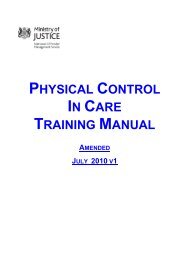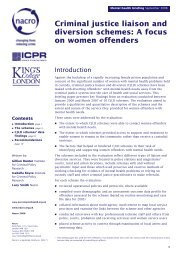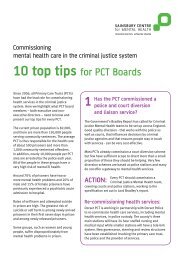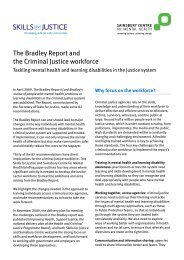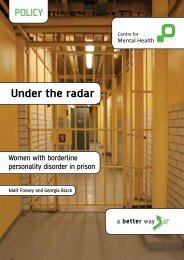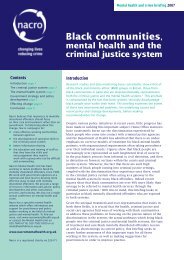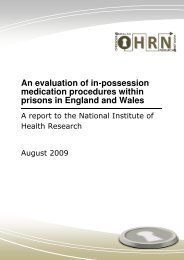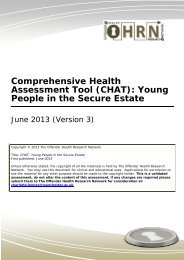Engendering Justice - from Policy to Practice - The Fawcett Society
Engendering Justice - from Policy to Practice - The Fawcett Society
Engendering Justice - from Policy to Practice - The Fawcett Society
- No tags were found...
Create successful ePaper yourself
Turn your PDF publications into a flip-book with our unique Google optimized e-Paper software.
Chapter Five:<strong>Justice</strong> Needs WomenWomen as Workers in the Criminal <strong>Justice</strong> SystemI work four days a week as a District Judge. It is reasonablyeasy <strong>to</strong> do at the District Bench because most casesare short. I gather that it is very difficult if not impossible<strong>to</strong> work less than 5 days a week at the higher end of thejudiciary, although personally I cannot see why if someoneis a circuit judge, for example, they cannot sit for 4 days aweek with cases lasting longer than 4 days having a dayoff on the Friday.Female Judge, Questionnaire Response, February 2009Judges were also concerned about how individuals weresimply allocated <strong>to</strong> a particular location without consultationand the problems this could present for women with youngchildren:I do think that a more transparent system for allocatingjudges <strong>to</strong> particular locations and areas of work and soon would be an improvement, so that one could actuallylook at the criteria being applied and assess for oneselfwhether they are fair or not. 249While another Judge <strong>to</strong>ld the Commission:It would be much more helpful if on first appointmentmore regard was had <strong>to</strong> childcare commitments and soon, with a dialogue about where one would prefer <strong>to</strong> sitrather than just being <strong>to</strong>ld where it was <strong>to</strong> be. 250I can see that it causes problems with those who haveyounger children and who may be sent <strong>to</strong> a distant cour<strong>to</strong>n a regular basis. Appointing women with children closer<strong>to</strong> home if they desired would assist.Female Judge, Questionnaire Response, February 2009<strong>The</strong> JAC has much work <strong>to</strong> do. For as Dame Hazel notes,the perception of the judiciary as a male-dominatedenvironment with limited support and female role models isunlikely <strong>to</strong> change until women are appointed <strong>to</strong> the HighCourt in sufficient numbers. 251Magistrates<strong>The</strong> Commission received some important input <strong>from</strong>women volunteering as Magistrates. Given the voluntarynature of this commitment, issues such as careerprogression are not relevant. However, the responsesrevealed a number of key themes which reflected theconcerns of women working within other criminal justiceagencies.Time-based concerns were common for Magistrateswith children, especially in relation <strong>to</strong> late sittings. As oneMagistrate <strong>to</strong>ld the Commission:I feel that the pressure <strong>to</strong> attend bench meetings,chairman’s meetings and training sessions on <strong>to</strong>p of mysittings shows a failure <strong>to</strong> recognise the demands alreadymade on my time as a busy working wife and mother. 252It was also noted that the change <strong>from</strong> half day sittingallocation <strong>to</strong> an all day allocation basis in some court areasmade it more difficult for parents needing <strong>to</strong> pick children up<strong>from</strong> school. This is exacerbated by the inability <strong>to</strong> predictfinishing time:I am sure that females with children or carers find itdifficult <strong>to</strong> predict home time. Courts are also so busywith so much extra reading <strong>to</strong> do for staff and so muchchange that a day is often <strong>to</strong>o intense <strong>to</strong> fit in<strong>to</strong> reducedhours. 253<strong>The</strong>re were also concerns that given childcare andemployment obligation restrictions, there were far more JPsof retirement age than of working age. Many respondentsrecommended that there was a need for childcarereimbursement (which is provided by the Courts) <strong>to</strong> be morewidely publicised beyond the website and the applicationform, so that young women are aware of this benefit andmight be more likely <strong>to</strong> apply.When I first entered the community room it was like goingback 100 years, there was <strong>from</strong> the very start a feeling ofdiscrimination against female magistrates and the “jobsfor the boys“ mentality. I felt like a second class citizen,still do, and nothing seems <strong>to</strong> have changed since I wasappointed almost three years ago. I still feel apprehensivewhen entering the room hoping there are other friendlyfemale magistrates there. You are sometimes completelyignored on the bench, especially when sitting with twomale colleagues when trying <strong>to</strong> discuss a case.Female Magistrate, Questionnaire Response, March 2009Page 76



